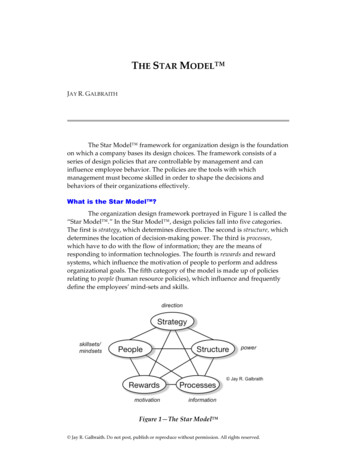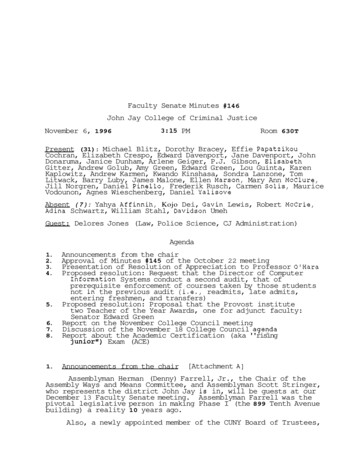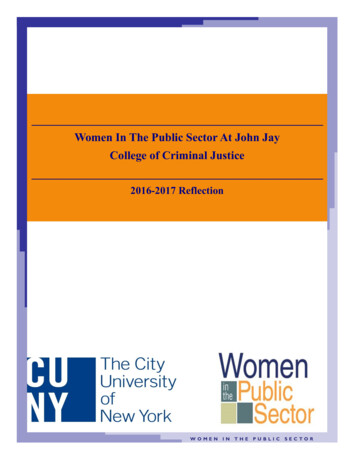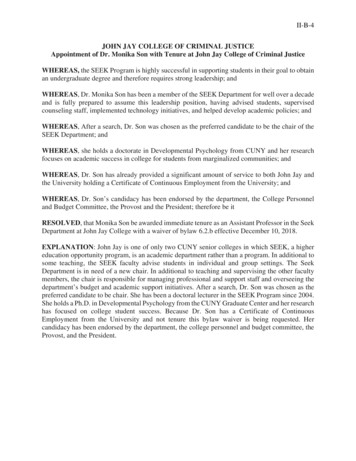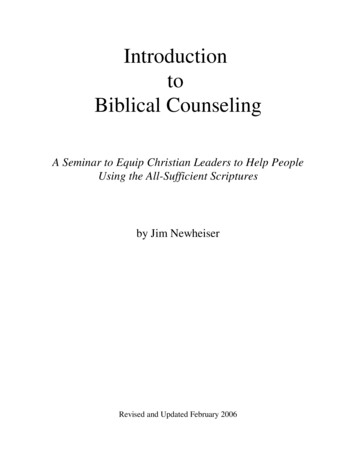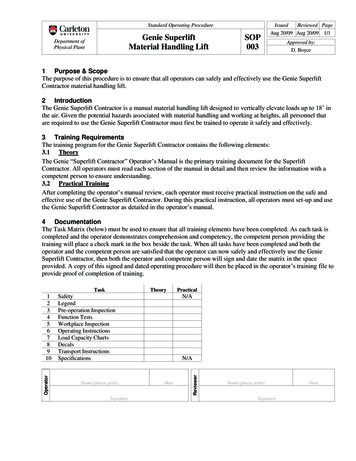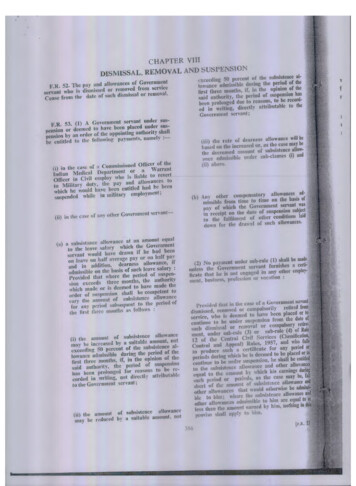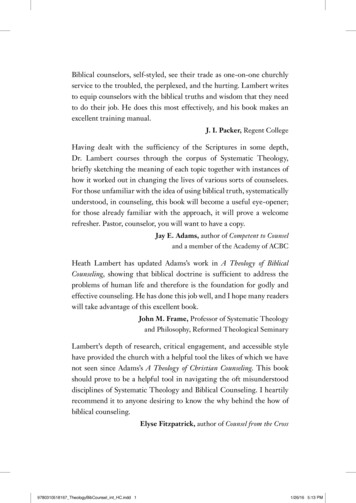
Transcription
Biblical counselors, self- styled, see their trade as one- on- one churchlyservice to the troubled, the perplexed, and the hurting. Lambert writesto equip counselors with the biblical truths and wisdom that they needto do their job. He does this most effectively, and his book makes anexcellent training manual.J. I. Packer, Regent CollegeHaving dealt with the sufficiency of the Scriptures in some depth,Dr. Lambert courses through the corpus of Systematic Theology,briefly sketching the meaning of each topic together with instances ofhow it worked out in changing the lives of various sorts of counselees.For those unfamiliar with the idea of using biblical truth, systematicallyunderstood, in counseling, this book will become a useful eye- opener;for those already familiar with the approach, it will prove a welcomerefresher. Pastor, counselor, you will want to have a copy.Jay E. Adams, author of Competent to Counseland a member of the Academy of ACBCHeath Lambert has updated Adams’s work in A Theology of BiblicalCounseling, showing that biblical doctrine is sufficient to address theproblems of human life and therefore is the foundation for godly andeffective counseling. He has done this job well, and I hope many readerswill take advantage of this excellent book.John M. Frame, Professor of Systematic Theologyand Philosophy, Reformed Theological SeminaryLambert’s depth of research, critical engagement, and accessible stylehave provided the church with a helpful tool the likes of which we havenot seen since Adams’s A Theology of Christian Counseling. This bookshould prove to be a helpful tool in navigating the oft misunderstooddisciplines of Systematic Theology and Biblical Counseling. I heartilyrecommend it to anyone desiring to know the why behind the how ofbiblical counseling.Elyse Fitzpatrick, author of Counsel from the Cross9780310518167 TheologyBibCounsel int HC.indd 11/26/16 5:13 PM
I wholeheartedly recommend this volume by my friend Heath Lambert.He provides a great basic theology for the field of Biblical Counselingthat is sorely needed. . . . His well- t hought- out arguments and addressing of controversial issues give much for the seasoned biblical counseloror academic (or even critic of Biblical Counseling) to consider. In short,I believe any Christian committed to or interested in counseling willbenefit from reading this book.John Babler, Professor of Counseling,Southwestern Baptist Theological SeminaryA Theology of Biblical Counseling is an outstanding contribution tothe entire evangelical community. Heath demonstrates with real- lifeexamples that theology is important not only for counseling but for living an authentic Christian life. Anyone, counselor or not, who wants tohelp a fellow believer along the way will profit greatly from this book.Jerry Bridges, author of Trusting God Even When Life HurtsHeath Lambert demonstrates the vital connection between the messageof the Bible, its relevance to life in a broken world, and its significancein the practice of counseling. Building on the foundation of Jay Adams,he summarizes key theological doctrines and imbeds them deeply intothe counseling practice using compelling case studies throughout eachchapter . . . every counselor’s counselees and practice will benefit fromreading this book.Kevin Carson, Professor of Biblical Counseling,Baptist Bible College and Theological SeminaryCounseling cannot be considered biblical without a proper orientation toGod and his Word. Heath Lambert brings clarity and help to the counselor as he tackles often misunderstood issues like sufficiency, commongrace, and general revelation. I would recommend this book to any studentof the Bible but particularly those who call themselves biblical counselors.Garrett Higbee, Executive Director of theBiblical Counseling Coalition9780310518167 TheologyBibCounsel int HC.indd 21/26/16 5:13 PM
After reading this volume I am convinced that Christian counselorsand teachers of counseling will find it one of the best and most helpfulcounseling manuals presently available. I will certainly use this book asa required- reading assignment for my students.Dr. Wayne Mack, Professor of Biblical Counseling, Director ofStrengthening Ministries Training Institute, ACBC Africa;Pastor/elder, Lynnwood Baptist ChurchIf you are a counselor your counsel has no authority if it is not built upona solid biblical theology. In A Theology of Biblical Counseling, Dr. HeathLambert has made a significant contribution to biblical counseling bydemonstrating how good theology must inform both the theory andthe practice of Christian counseling. Every sincere Christian counselorshould read and digest this book!Dr. John D. Street, Chair, MABC Graduate Program,The Master’s College and Seminary; President,Association of Certified Biblical Counselors (ACBC)There is no other book like this. . . . Dr. Lambert does a wonderful jobof using case studies to connect biblical counseling to each area of theology in very practical way. . . . This book makes me excited about thefuture of biblical counseling (and I don’t excite easily).Jim Newheiser, Executive Director of the Institutefor Biblical Counseling and DiscipleshipA Theology of Biblical Counseling is a delight to read. Heath Lambertshows us with great wisdom and skill that evangelical theology and practical ministry go together beautifully! If you are looking for a readable,bite- sized volume that relates powerful biblical truth to the everydaychallenges of Christian living, this book is for you.Lance Quinn, Senior Pastor, Thousand Oaks Bible Church9780310518167 TheologyBibCounsel int HC.indd 31/26/16 5:13 PM
Due to its maturity and depth, A Theology of Biblical Counseling is sure tobecome a text used by friends and foes alike. Get it. Read it. Ponder it.Discuss it. Give it away. May it be used to advance the cause of BiblicalCounseling and the Kingdom of the risen, reigning King of Kings.George C. Scipione, Director of the BiblicalCounseling Institute of the ReformedPresbyterian Theological SeminaryA Theology of Biblical Counseling is an invaluable book for biblical soulcare within the church. Theologian John Frame has written that truetheology is application. Lambert’s book is certainly an example of thistruth in how it applies theology to real- life discipleship counseling scenarios. In his work, he clearly shows us just how the Scriptures can besufficient for counseling issues of the heart and life.Dr. Stuart W. Scott, Professor of BiblicalCounseling, The Master’s CollegeOne of the most important books written on biblical counseling in thisgeneration. Heath Lambert does an excellent job of addressing crucialbiblical truths in a practical and understandable way. This book willbe helpful for everyone from the beginning counselor to the seasonedpractitioner or professor. . . . I wholeheartedly commend it to you.Dr. Stephen Viars, Senior Pastor, Faith Church9780310518167 TheologyBibCounsel int HC.indd 41/26/16 5:13 PM
A THEOLOGYOF BIBL ICA LCOU NSEL I NG9780310518167 TheologyBibCounsel int HC.indd 11/26/16 5:13 PM
Also by Heath LambertFinally Free: Fighting for Purity with the Power of Grace9780310518167 TheologyBibCounsel int HC.indd 21/26/16 5:13 PM
A THEOLOGYOF BIBL ICA LCOU NSEL I NGThe Doctrina l Foundationsof Counseling Ministr yHeath L a mber t9780310518167 TheologyBibCounsel int HC.indd 31/26/16 5:13 PM
ZONDERVANA Theology of Biblical CounselingCopyright 2016 by Heath LambertThis title is also available as a Zondervan ebook.Visit www.zondervan.com/ebooks.Requests for information should be addressed to:Zondervan, 3900 Sparks Dr. SE, Grand Rapids, Michigan 49546Library of Congress Cataloging- in- Publication DataNames: Lambert, Heath, 1979Title: A theology of biblical counseling : the doctrinal foundations of counseling ministry /Heath Lambert.Description: Grand Rapids : Zondervan, 2016.Identifiers: LCCN 2015039601 ISBN 9780310518167 (hardcover, printed)Subjects: LCSH: Counseling — Religious aspects — Christianity. Theology.Classification: LCC BR115.C69 L36 2016 DDC 253.5 — dc23 LC record available at http://lccn .loc.gov/2015039601Unless otherwise indicated, all Scripture quotations are from the ESV (The Holy Bible,English Standard Version ). Copyright 2001 by Crossway, a publishing ministry of GoodNews Publishers. Used by permission. All rights reserved.Scripture quotations marked NIV are taken from The Holy Bible, New International Version ,NIV . Copyright 1973, 1978, 1984, 2011 by Biblica, Inc. Used by permission of Zondervan. Allrights reserved worldwide. www.Zondervan.com. The “NIV” and “New International Version”are trademarks registered in the United States Patent and Trademark Office by Biblica, Inc. Any Internet addresses (websites, blogs, etc.) and telephone numbers in this book are offeredas a resource. They are not intended in any way to be or imply an endorsement by Zondervan,nor does Zondervan vouch for the content of these sites and numbers for the life of this book.All rights reserved. No part of this publication may be reproduced, stored in a retrievalsystem, or transmitted in any form or by any means— electronic, mechanical, photocopy,recording, or any other— except for brief quotations in printed reviews, without the priorpermission of the publisher.Art direction: Chris Tobias, Outerwear for BooksInterior design: Kait LampherePrinted in the United States of America16 17 1 8 19 20 21 22 2 3 2 4 25 26 /DHV/ 15 14 13 12 11 1 0 9 8 7 6 5 4 3 2 19780310518167 TheologyBibCounsel int HC.indd 41/26/16 5:13 PM
To Lauren— The best wife ever9780310518167 TheologyBibCounsel int HC.indd 51/26/16 5:13 PM
9780310518167 TheologyBibCounsel int HC.indd 61/26/16 5:13 PM
CONTENTSAcknowledgments . . . . . . . . . . . . . . . . . . . . . . . . . . . . . . . . . . . . . . . . . 91Counseling and Theology: A Crucial Introduction . . . . . . . . . . 112Biblical Counseling and a Theology of Scripture . . . . . . . . . . . 353Biblical Counseling and a Theology of Common Grace . . . . . . 654Biblical Counseling and a Theology of God . . . . . . . . . . . . . . . 1025Biblical Counseling and a Theology of Christ . . . . . . . . . . . . . . 1366Biblical Counseling and a Theology of the Holy Spirit . . . . . . . 1587Biblical Counseling and a Theology of Humanity . . . . . . . . . . 1808Biblical Counseling and a Theology of Sin . . . . . . . . . . . . . . . . 2149Biblical Counseling and a Theology of Suffering . . . . . . . . . . . 24710 Biblical Counseling and a Theology of Salvation . . . . . . . . . . . 27411 Biblical Counseling and a Theology of the Church . . . . . . . . . .30412 Biblical Counseling and the Goal of Theology . . . . . . . . . . . . . 315Appendix A Statement from the Association of Certified BiblicalCounselors Regarding Mental Disorders, Medicine, and Counseling . 321Appendix B Biblical Counseling, General Revelation,and Common Grace . . . . . . . . . . . . . . . . . . . . . . . . . . . . . . . . . . . . 326Appendix C The Standards of Doctrine of the Association ofCertified Biblical Counselors . . . . . . . . . . . . . . . . . . . . . . . . . . . . . . 330Scripture Index . . . . . . . . . . . . . . . . . . . . . . . . . . . . . . . . . . . . . . . . . . . 3379780310518167 TheologyBibCounsel int HC.indd 71/26/16 5:13 PM
9780310518167 TheologyBibCounsel int HC.indd 81/26/16 5:13 PM
ACKNOWLEDGMENTSThe fact that my name appears on the front of this book could leadto the appearance that I did not have any help in writing it. That isnot true. In fact, I have had so much help in writing that I scarcely knowwhere to begin to say “thank you,” but I shall start with the big pictureof my theological influences.The people most instrumental in my thinking about theology areBruce Ware, Wayne Grudem, Jay Adams, John Frame, R. C. Sproul, andBill Barclay. I am privileged to know Drs. Ware, Adams, and Barclay buthave only met Drs. Grudem, Frame, and Sproul. I have been influencedby the teaching of each one in their writing and speaking. I have read theworks of many theologians, but these have been the most influential inmy thinking. I owe a debt to each of these men who have so influencedme. The deficiencies in this book flow from my failures to measure upto their high standards.Apart from these theological influences, I am also incredibly thankful for the efforts of people who helped more directly with the writingof this book. I am grateful to Al Mohler, Randy Stinson, and the boardof The Southern Baptist Theological Seminary. They graciously gaveme a sabbatical so I could work on this book.I am also grateful to the board of the Association of Certified BiblicalCounselors (ACBC). I am accountable to these incredible men as theexecutive director of that organization, and I am glad they encouragedme to work on books like this one. I am grateful to the staff of ACBC, awonderful group of Christian servants who have greatly encouraged mywork on this project. In particular, my assistant, Rebecca Maketansky,99780310518167 TheologyBibCounsel int HC.indd 91/26/16 5:13 PM
A Theology of Biblical Counselinghas diligently labored to make room in my schedule to complete thisproject. I also must thank my Introduction to Biblical Counseling classin the fall semester of 2015. Their support on this book was meaningfuland immeasurable.I am also thankful to Zondervan. I am so appreciative of the entireteam there who make it a privilege to be in ministry partnership together.In particular, I am grateful for my editor, Ryan Pazdur. Ryan and I havebeen working together for years now, and he has become a friend. Heis a godly man who loves Jesus, has a keen editorial eye, and approacheshis projects in a pastoral way that I have never seen from anyone else.Many people worked to review this manuscript and provide helpful comments. I am so grateful to Wayne Johnston, Lance Quinn, andStuart Scott, whose comments greatly improved this project. I am alsothankful for Renee Jarrett, the office administrator at ACBC, who hasa great eye for grammar and bailed me out of trouble before anyoneelse saw problems. In particular, I am so thankful for the work of CotyHoskins. He spent hours working on the notes for each chapter andmaking other helpful comments. I don’t think I could have finished thisbook without his help.When I come to the end of a book, I am always amazed at how muchit is a product not just of my labor but of my wife, Lauren’s, as well. Isimply could not write without my wife’s kindness to me in her encouragement, care for me, and care of our children. She is my very favoriteperson in the world, and I am so glad she is my wife. There is no personwho has ever been more helpful to me, except for Jesus himself.Which leads me to the most important person there is to thank.As I have been working on this book, the reality that impressed itselfupon me most significantly is the amazing grace of Jesus Christ, whohas saved me from sin and revealed such precious truth to his church inthe pages of his Word. I am so thankful for a Savior who does not justpromise a seat in heaven, but who gives power to live life on earth. Oh,how I desire the readers of this book to know that there is nothing goodin me, or in the pages that follow, that did not first come from him.109780310518167 TheologyBibCounsel int HC.indd 101/26/16 5:13 PM
CHAPTER 1COUNSELING ANDTHEOLOGY: A CRUCIALINTRODUCTIONCounseling is a theological discipline.There.If you have continued to read beyond that first sentence, you havealready completed the most controversial part of this book. That veryfirst sentence should be the most debated statement in this entire work.A Theology of Biblical Counseling will do what theology often does— inspire questions and debate. But the most controversial statement Iknow to make in this context is to assert that counseling is, by definition, theological.Most people do not assume the theological nature of counseling.Most believe that theology is what future ministers of the gospel studyin seminary in order to be qualified to lead a church and preach sermonsor go on the mission field. They do not understand that theology hasa serious role to play in helping people with their counseling problems.They believe instead that counseling happens in the realm of psychology. Most believe that theology is to ministers what psychology is tocounselors, and the two do not really have much to do with each other.11. David G. Myers, “A Levels-of-Explanation View,” in Eric L. Johnson, ed., Psychology &Christianity: Five Views (Downers Grove, IL: InterVarsity, 2010), 49–78.119780310518167 TheologyBibCounsel int HC.indd 111/26/16 5:13 PM
A Theology of Biblical CounselingChristians have never believed, however, that theology servesso limited a role. They have insisted that theology informs all of life.Surveying the evidence for such a biblical position will demand moreof this book than it should be expected to bear. Before we can proceed,however, it is essential to demonstrate, at the very least, that theologyinforms counseling. We will understand this when we see what theologyis, what counseling is, and what counseling requires.The Nature of TheologyWe will not be ready to understand the theological import of counselinguntil we first understand what theology is. The definition of systematictheology provided by Wayne Grudem and John Frame is the definitionI will use for theology in this book. These men say that theology is“what the whole Bible teaches us today about any given topic.”2 Threeobvious elements of this definition stand out.First, systematic theology is about the teachings of the entire Bible.It is not uncommon to hear some people express disapproval of theologyin favor of biblical interpretation. They are concerned that our theological systems will exert a controlling and distorting effect on texts ofScripture. This concern is a possibility, but when it happens, it is badtheology, not good theology. Good theology is concerned with doingcareful interpretation of all of the relevant texts in Scripture about a topicand then doing the hard work of discerning how to place those textstogether. Good theology is not at odds with careful biblical interpretation, but stands on faithful interpretation of individual texts that seeks tounderstand these texts together in the context of the entire Bible.A second element of this definition of theology is that it concernswhat the whole Bible teaches us today. Good theology must be contemporary theology. Contemporary theology does not mean that we develop2. Wayne A. Grudem, Systematic Theology: An Introduction to Biblical Doctrine (GrandRapids, MI: Zondervan, 1994), 21. In his systematic theology, Grudem provides this definitionin the form of a question. He says that systematic theology asks, “What does the whole Bibleteach us today?” He also makes clear that he learned this definition from John Frame, who hasprofoundly influenced him in his theology.129780310518167 TheologyBibCounsel int HC.indd 121/26/16 5:13 PM
Counseling and Theology: A Crucial Introductionnew truth in each age. Instead, it means that we seek to understand howthe old truths in God’s Word apply to our contemporary setting. Manytextbooks on Christian theology have been written during the historyof the church. You might wonder why Christian authors continue toproduce new works of theology when there are so many from the past.One reason is that the church continually confronts new threats to thetruth of God’s Word. When this happens, Christians must take theancient text of Scripture and apply it in ways that are freshly relevant.Good theology is not just a recitation of what the church has believed,though that is important. It also includes what the church must believetoday in the midst of contemporary threats.Finally, the definition of theology emphasizes that theology is concerned with establishing what the Bible teaches today about any giventopic. The work of theology is to understand what God thinks about anytopic. When we pay careful attention to every relevant passage in the Bibleon a topic, we should know what God has revealed to us about that topic.In this book we are concerned with establishing what God has revealedabout counseling. But first, we must understand what counseling is.The Nature of CounselingWhat is counseling? It is important to supply a definition of counselingat the very beginning so we know what we are talking about. This isthe definition I use in this book: Counseling is a conversation where oneparty with questions, problems, and trouble seeks assistance from someonethey believe has answers, solutions, and help.This definition is an intentionally inclusive one. Many people withmany different counseling commitments could map all manner of conceptual and practical assumptions onto this definition, but I believe itcovers the counseling that all of us are doing, whether it is at the lay orprofessional level or done with religious or secular commitments. Letme make two observations about this definition.First, according to this definition, people are counseling all the139780310518167 TheologyBibCounsel int HC.indd 131/26/16 5:13 PM
A Theology of Biblical Counselingtime. You are counseling all of the time. Counseling is what happenswhen a woman with a diagnosis of seasonal affective disorder talks inthe office of a man with degrees from Yale who is licensed by his state,charges a fee for their conversation, and bills her insurance company forit. Counseling is also what happens when a pastor talks with a womanwho is considering leaving her husband and seeks advice from him abouther options. Counseling is what happens when a boss calls an employeeinto the office to discuss a problem with job performance. Counselinghappens when a fourth grader talks with his parents about kids beingmean to him at school. It is what happens when a man calls his friend toask for advice on taking a promotion at work.Counseling, as all of these examples indicate, might be formal orinformal, highly relational or more professional, religious or secular.Counseling happens whenever a person with questions, problems, andtrouble seeks to talk with someone they believe has answers and solutions and can offer help. All of us do it all the time. There is no person orgroup of people who can lay claim to the exclusive right or prerogativeto be a counseling practitioner.Second, this definition has two sides. On the one hand, counselingrequires one party in the conversation to have questions, problems,and trouble. One member of the counseling conversation must have adilemma.3 The potential dilemmas are legion. The questions, problems,and trouble that consume counseling conversations are a lengthy listthat defies enumeration. The list includes decisions about whom tomarry, where to go to school, which job to take. It involves counselingthose who are suicidal, in abusive marriages, addicted to drugs, hearing strange voices. Counseling conversations comprise doubts aboutwhether someone should trust in Jesus Christ, what permissions the3. It is worth noting that this person must usually have an awareness of his dilemma ifcounseling is to continue for very long. Obviously persons can have all manner of difficultiesthat do not seem to them to be problems. They might be in a toxic relationship that they ratherenjoy. They may fume with sinful anger while insisting that they are being reasonable. Theymay be lost as can be and hate God. Such people have serious trouble but do not know it. If wecannot persuade them of their trouble, then counseling will not happen for very long. From theperspective of biblical counseling, we would say such a person is not a counselee.149780310518167 TheologyBibCounsel int HC.indd 141/26/16 5:13 PM
Counseling and Theology: A Crucial IntroductionBible grants about divorce and remarriage, whether the Holy Spirit isa vibrant part of one’s daily life. All of these and gazillions more arethe kinds of things that hurting people put on the table when they seekassistance in conversations that we so often call counseling.On the other hand, counseling requires another party in the conversation to have answers, solutions, and help. That means one party inthe discussion must offer assistance for the dilemma being experiencedby the struggling person. From the perspective of this book, and thelarger biblical counseling movement, counseling is not mere commiseration. It is more than just hanging out. In order for counseling to occur,one participant in the conversation must move toward the strugglingperson with answers, solutions, and help.For our purposes, we will refer to the person with questions,problems, and trouble as the counselee. We will consider the person withanswers, solutions, and help to be the counselor. Counseling is a conversation that a counselee has with a person they believe to be a counselor.What Counseling RequiresNow that we have a definition of what counseling is, I want to statewhat counseling requires. However, it will be most helpful to discussfirst what it does not require.Counseling does not require any of the trappings of professionalism. Though we often picture counseling as a very professional activity,it is not required that you be an expert in order to do it. Indeed, if whatI stated above is true, most of the people doing counseling (i.e., teachers, parents, coworkers, friends, church members, etc.) lack any formalexpertise to do it. As much as we often cherish the trappings of professionalism, like formal offices, distinguished degrees, and state licenses,none of that is required to do counseling— or even to do it well.44. I want to be clear here that this is not a statement of preference but of fact. I certainlyvalue a commitment to do counseling well and believe that honing skill will often require thingslike quality training and certifications. I am simply pointing out the fact that most of the peoplewho do counseling have no formal qualifications to do it.159780310518167 TheologyBibCounsel int HC.indd 151/26/16 5:13 PM
A Theology of Biblical CounselingI should also make another, potentially awkward, admission rightout of the gate. In counseling there is no requirement that the personproviding the counsel have correct answers, faithful solutions, or effectivehelp. Do not misunderstand. We should want people doing counselingto offer sound answers, assistance, and help. Unfortunately, manypeople do not. Today, as you read this book, counselors all over theworld— whether professional or unprofessional, trained or untrained,w ill offer counsel that is absolutelyexperienced or inexperienced— dreadful. A mother will tell her daughter to divorce her husband whenshe should not. A college student will tell his friend not to stress outabout an overwhelming problem, which will be the very thing in hisfriend’s mind when he takes his own life. Right now counselors are telling men who hate being sexually attracted to other men that it is okayto be gay. This afternoon counselors will be harsh when they should bekind. Others will be flippant when they should be firm. Sometime todaysome counselor will send a woman with a black eye back into the housewhere her abusive husband lives. Unfortunately, there is no requirementthat a person who practices counseling be any good at it.So what is required to do counseling? If you do not need degrees orskill— t hings most would assume are a must— t hen what do you need?To do counseling, the one thing the counselor must do is articulatesome vision of reality that understands the dilemma of the counseleeand offers a response to that dilemma.Everyone has commitments to a certain way of seeing life. Somepeople call this a worldview.5 Whatever the label, it is a vision about life,what it is, and how it works. This vision of life may be wise or foolish.People may or may not be self- conscious about their vision of life. Buteveryone possesses such a vision.5. Ronald H. Nash, Worldviews in Conflict: Choosing Christianity in a World of Ideas (GrandRapids, MI: Zondervan, 1992), 16: “In its simplest terms, a worldview is a set of beliefs about themost important issues in life. . . . These beliefs must cohere in some way and form a system. Afancy term that can be useful here is conceptual scheme, by which I mean a pattern or arrangementof concepts (ideas). A worldview, then, is a conceptual scheme by which we consciously or unconsciously place or fit everything we believe and by which we interpret and judge reality.”169780310518167 TheologyBibCounsel int HC.indd 161/26/16 5:13 PM
Counseling and Theology: A Crucial IntroductionAnyone engaging in counseling will have a vision of life thatincludes who we are, what is wrong with us, what should be right withus, and what it would take to fix the problem. When someone is havinga conversation about a problem they are having, that other person inthe conversation is articulating an understanding of what it means to behuman and experiencing life. He is explaining his understanding of whythis person’s life does not appear to be working for them. He is providing his understanding of what is the normative standard for the person’slife— that is, the standard the person departed from that brought onthe problem. Finally, he has some sense of how to help the person movefrom the dilemma to a solution.Counseling Is TheologicalUnderstanding that counseling requires some vision of life is crucial tounderstanding the theological nature of counseling. The reason is thatsuch a vision of reality is always theological. God defines what it is to bea human being, and he describes that in his Word. God knows what iswrong with us and diagnoses the problem in the Bible. God prescribes asolution to our problems— faith in Christ— and reveals him to us in theScriptures. God authorizes a process of transformation and shows uswhat it looks like in the pages of the Old and New
I believe any Christian committed to or interested in counseling will benefit from reading this book. John Babler, Professor of Counseling, Southwestern Baptist Theological Seminary A Theology of Biblical Counseling is an outstanding contribution to the entire


